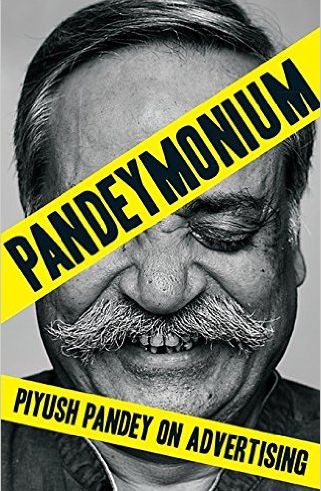by Swapan Seth
In the very first page of his book, Pandeymonium, Piyush breaks into a song. And typically, it is a song that is mined from the deep and rich recesses of his memories. A brightly lit cave called life.
And then, like the fine wicket keeper that he was, he stumps you with the words: “ Amma, chai pakayi kya?” He quickly explains the phrase; you inch back into the crease and the rest of your innings starts.
 At this early stage in the game, Piyush declares. That he was born with a Creative Director: his mother (Ogilvy and Mater?). That the Creative Department that he was weaned on lived at home. That he has blatantly stolen some of his greatest lines from moments with Nita, his wife. He confesses that he is a kleptomaniac. Who stole from time. Who stole from moments. Who stole through observation.
At this early stage in the game, Piyush declares. That he was born with a Creative Director: his mother (Ogilvy and Mater?). That the Creative Department that he was weaned on lived at home. That he has blatantly stolen some of his greatest lines from moments with Nita, his wife. He confesses that he is a kleptomaniac. Who stole from time. Who stole from moments. Who stole through observation.
He abdicates his success. Just like a fine captain would to let the player on the other end complete his century.
The book then moves to cricket. There he takes off his wicket keeping gloves and takes the ball. Bowling you over with the lessons it taught him. Passion, teamwork, sacrifices, winning and losing.
And just when you put up your feet on the table, comfortable with the trot of his tales, he tells you about how his father wanted a table to be constructed and how that was fodder for Fevicol. Wheels within wheels, you think.
Just then he recounts his journeys on the trains and how they brought him to a station called “ Chhuk Chhuk Gaari” for The Indian Railways.
After this the book changes character. From a student it morphs into a teacher. He tells you to you never let the child in you become an adult. He urges you to be fearless in the face of systems and processes. Encouraging you to follow just one process: living.
He asks why a man who drinks Teacher’s uses this lamp post called research? For support or for illumination?
Then come strains of music. Swiftly followed by how one must celebrate celebrities. Selecting your sounding boards. Seeing the good in your clients. The merits of “ lala” clients. Multi –cultural and why he hates the word “ multinational”.
In one chapter, he talks about his roots. In another he talks about how he gave wings. And in the final chapter he answers the question we could never ask him: Will he start his own agency?
Finally, a word about Anant Rangaswami. Piyush chose him to co write his book. And now I understand why. It was ordained.
They both believe in a simple credo: “ You can accomplish anything in life, so long as you don’t worry who gets the credit.”
)
)
)
)
)